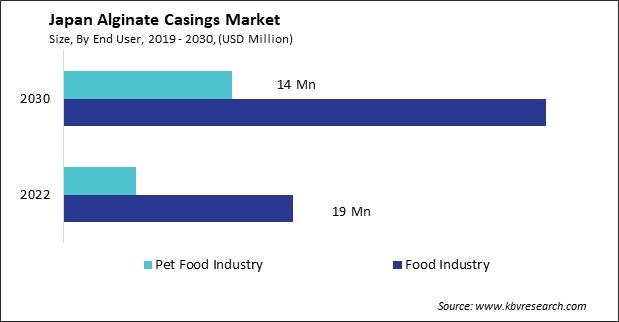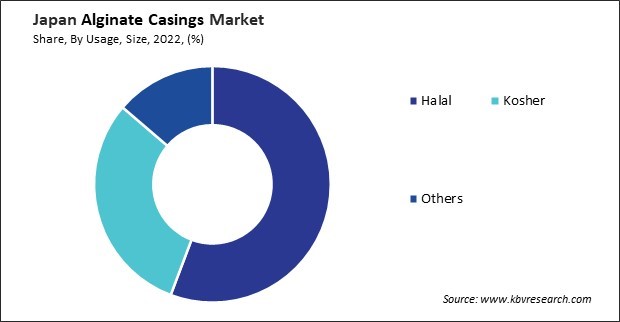Japan Alginate Casings Market Size, Share & Trends Analysis Report By End User, By Usage (Halal, Kosher, and Others), By Application (Meat, Fish, and Vegan), By Type (Flavored, Colored, and Basic), and Forecast, 2023 - 2030
Published Date : 02-Sep-2024 |
Pages: 49 |
Formats: PDF |
COVID-19 Impact on the Japan Alginate Casings Market
The Japan Alginate Casings Market size is expected to reach $54.1 Million by 2030, rising at a market growth of 10.3% CAGR during the forecast period.
The alginate casings market in Japan has been experiencing notable growth in recent years, driven by various factors such as technological advancements, changing consumer preferences, and increasing demand for convenient food packaging solutions. Alginate casings, made from sodium alginate derived from seaweed, offer several advantages over traditional casings, including better moisture retention, improved texture, and enhanced shelf life for food products.

One of the key drivers of growth in the alginate casings market is the rising demand for processed and convenience foods in Japan. As urbanization and hectic lifestyles become more prevalent, consumers are increasingly seeking convenient food options that require minimal preparation time. Alginate casings provide an ideal solution for manufacturers looking to meet this demand by offering easy-to-use, ready-to-cook packaging for various food products such as sausages, seafood, and dairy items.
Furthermore, the growing awareness among consumers regarding health and wellness is fueling the demand for alginate casings. Unlike traditional casings made from animal intestines, alginate casings are plant-based and are perceived as a healthier alternative by health-conscious consumers. Additionally, alginate casings are free from allergens such as gluten and are suitable for consumers with dietary restrictions, further widening their appeal in the industry. The food industry in Japan is known for its innovation and commitment to quality, and manufacturers are increasingly incorporating alginate casings into their product offerings to stay ahead of the competition.
However, COVID-19 has significantly impacted the alginate casings market in Japan. The pandemic has disrupted supply chains, leading to raw material sourcing and production operations challenges. Additionally, the shift in consumer behavior towards home-cooked meals and essential food items has temporarily reduced the demand for processed and convenience foods, including products packaged in alginate casings.
Market Trends
Expansion In the Food Processing Industry
The food processing industry in Japan has witnessed significant growth in recent years. Within this dynamic landscape, the alginate casings market, an edible casing used in food processing, has emerged as a key segment poised for expansion. The versatility of alginate casings makes them well-suited for various food processing applications. They are easily customized to meet specific product requirements in size, shape, and texture, allowing food manufacturers to innovate and differentiate their offerings in the industry.
One of the primary drivers of growth in the alginate casings market in Japan is the increasing emphasis on food safety and quality. According to the U.S. Department of Agriculture, in 2020, Japan's food processing industry successfully produced food and beverage products amounting to $218.3 billion. The pandemic further contributed to the decade-long upward trend in food consumption, which has jumped from $5.56 billion in 2010 to $6.57 billion in 2020. With consumers in Japan becoming more discerning about their products, there is a growing demand for food products free from harmful additives and preservatives.
Moreover, the growing trend towards sustainability and environmental consciousness has also contributed to expanding the alginate casings market in Japan. As Japanese consumers become more aware of the environmental impact of their consumption habits, there is a rising demand for eco-friendly packaging solutions. Thus, the growing demand for customizable, safe, and eco-friendly packaging solutions has propelled the expansion of the alginate casings market in Japan's thriving food processing industry.
Rising Demand for Processed Meat and Seafood Products
The alginate casings market in Japan is experiencing a surge in demand, primarily driven by the rising consumption of processed meat and seafood products. One of the key drivers behind the increasing demand for processed meat and seafood products is the growing urbanization and hectic lifestyles prevalent in Japan. As more people move to urban areas and adopt busier schedules, there is a greater demand for convenient food options that require minimal preparation time. Processed meat and seafood products, such as sausages, hot dogs, and seafood sticks, fit perfectly into this niche, offering quick and easy meal solutions for busy individuals and families.
Furthermore, the popularity of processed meat and seafood products is also fueled by changing dietary habits and cultural influences. Japanese consumers are increasingly embracing Western-style cuisines and incorporating processed meat and seafood items into their meals. Additionally, the rising popularity of snacking culture further boosts the demand for convenient and portable food options like sausages and seafood snacks.
Moreover, the use of alginate casings aligns with the increasing emphasis on food safety and sustainability in Japan. Alginate, derived from seaweed, is a natural and biodegradable material, making it an environmentally friendly option compared to synthetic casings. As consumers become more conscious of the environmental impact of their food choices, products packaged in alginate casings are likely to gain further traction in the industry. Hence, the surge in demand for alginate casings in Japan is driven by the growing consumption of processed meat and seafood products, fueled by urbanization, changing dietary habits, and a heightened emphasis on food safety and sustainability.

Competition Analysis
The alginate casings market in Japan is influenced by rich culinary traditions, stringent quality standards, and a growing demand for innovative packaging solutions. One prominent company in the alginate casings market is Nippon Paper Industries Co., Ltd., a leading manufacturer of paper and pulp products with a significant presence in the food packaging industry. Nippon Paper Industries produces a range of packaging materials, including alginate-based casings, leveraging its expertise in sustainable and environmentally friendly solutions. With a focus on quality and innovation, the company serves Japanese food processors seeking reliable packaging options for various products.
Another major player is Aicello Corporation, a global leader in specialty packaging materials and solutions. While Aicello is known for its expertise in films, laminates, and coatings, it also offers alginate-based casings tailored to the needs of the food industry. With advanced manufacturing capabilities and a commitment to research and development, Aicello provides high-performance packaging solutions that meet the stringent requirements of Japanese food manufacturers.
Kuraray Co., Ltd. is also a significant player in the alginate casings market in Japan. Kuraray is a diversified chemical company that produces various materials, including specialty resins and fibers used in various applications. Leveraging its expertise in polymer science, Kuraray offers alginate-based casings known for their durability, flexibility, and barrier properties. These casings are widely used in Japan to package seafood products, processed meats, and other food items.
Moreover, companies like Shin-Etsu Chemical Co., Ltd. contribute to the alginate casings market with their chemical manufacturing and materials science expertise. Shin-Etsu produces alginate-based products used in food packaging, pharmaceuticals, and other industries, catering to the specific requirements of Japanese customers. With a focus on product quality and reliability, Shin-Etsu plays a vital role in supplying alginate casings to food processors and packaging manufacturers in Japan.
In addition to these established players, smaller companies and startups are emerging in the alginate casings market, bringing new ideas and technologies to the forefront. These companies often specialize in niche segments or offer customized solutions tailored to the unique preferences of Japanese consumers. Hence, the alginate casings market in Japan is characterized by a diverse range of companies, from multinational corporations to innovative startups.
List of Key Companies Profiled
- FMC Corporation
- Reiser
- Kalle GmbH
- Albert Handtmann Holding GmbH & Co. KG
- ViskoTeepak Holding Ab Ltd
- D2 Ingredients, LP
- J.Rettenmaier & Sohne GmbH Co KG
- Vaessen-Schoemaker B.V.
- Qingdao Hyzlin Biology Development Co.,Ltd.
- Compañía Española de Algas Marinas, S.A.,
Japan Alginate Casings Market Report Segmentation
By End User
- Food Industry
- Pet Food Industry
By Usage
- Halal
- Kosher
- Others
By Application
- Meat
- Fish
- Vegan
By Type
- Flavored
- Colored
- Basic
1.1 Market Definition
1.2 Objectives
1.3 Market Scope
1.4 Segmentation
1.4.1 Japan Alginate Casings Market, by End User
1.4.2 Japan Alginate Casings Market, by Usage
1.4.3 Japan Alginate Casings Market, by Application
1.4.4 Japan Alginate Casings Market, by Type
1.5 Methodology for the research
Chapter 2. Market Overview
2.1 Introduction
2.1.1 Overview
2.1.1.1 Market Composition and Scenario
2.2 Key Factors Impacting the Market
2.2.1 Market Drivers
2.2.2 Market Restraints
2.2.3 Market Opportunities
2.2.4 Market Challenges
2.2.5 Market Trends
2.3 Porter Five Forces Analysis
Chapter 3. Japan Alginate Casings Market
3.1 Japan Alginate Casings Market by End User
3.2 Japan Alginate Casings Market by Usage
3.3 Japan Alginate Casings Market by Application
3.4 Japan Alginate Casings Market by Type
Chapter 4. Company Profiles – Global Leaders
4.1 FMC Corporation
4.1.1 Company Overview
4.1.2 Financial Analysis
4.1.3 Regional Analysis
4.1.4 Research & Development Expenses
4.1.5 SWOT Analysis
4.2 Reiser
4.2.1 Company Overview
4.2.2 SWOT Analysis
4.3 Kalle GmbH
4.3.1 Company Overview
4.4 Albert Handtmann Holding GmbH & Co. KG
4.4.1 Company Overview
4.5 ViskoTeepak Holding Ab Ltd
4.5.1 Company Overview
4.6 J. Rettenmaier & Sohne GmbH Co KG
4.6.1 Company Overview
4.7 Vaessen-Schoemaker B.V.
4.7.1 Company Overview
4.8 Qingdao Hyzlin Biology Development Co.,Ltd.
4.8.1 Company Overview
4.9 Compañía Española de Algas Marinas, S.A.,
4.9.1 Company Overview
TABLE 2 Japan Alginate Casings Market, 2023 - 2030, USD Million
TABLE 3 Japan Alginate Casings Market by End User, 2019 - 2022, USD Million
TABLE 4 Japan Alginate Casings Market by End User, 2023 - 2030, USD Million
TABLE 5 Japan Alginate Casings Market by Usage, 2019 - 2022, USD Million
TABLE 6 Japan Alginate Casings Market by Usage, 2023 - 2030, USD Million
TABLE 7 Japan Alginate Casings Market by Application, 2019 - 2022, USD Million
TABLE 8 Japan Alginate Casings Market by Application, 2023 - 2030, USD Million
TABLE 9 Japan Alginate Casings Market by Type, 2019 - 2022, USD Million
TABLE 10 Japan Alginate Casings Market by Type, 2023 - 2030, USD Million
TABLE 11 Key Information – FMC Corporation
TABLE 12 Key Information –Reiser
TABLE 13 Key Information – Kalle GmbH
TABLE 14 Key Information – Albert Handtmann Holding GmbH & Co. KG
TABLE 15 Key Information – ViskoTeepak Holding Ab Ltd
TABLE 16 Key Information – J. Rettenmaier & Sohne GmbH Co KG
TABLE 17 Key Information – Vaessen-Schoemaker B.V.
TABLE 18 Key Information – Qingdao Hyzlin Biology Development CO., LTD.
TABLE 19 Key Information – Compañía Española de Algas Marinas, S.A.,
List of Figures
FIG 1 Methodology for the research
FIG 2 Japan Alginate Casings Market, 2019 - 2030, USD Million
FIG 3 Key Factors Impacting Alginate Casings Market
FIG 4 Porter’s Five Forces Analysis – Alginate Casings Market
FIG 5 Japan Alginate Casings Market share by End User, 2022
FIG 6 Japan Alginate Casings Market share by End User, 2030
FIG 7 Japan Alginate Casings Market by End User, 2019 - 2030, USD Million
FIG 8 Japan Alginate Casings Market share by Usage, 2022
FIG 9 Japan Alginate Casings Market share by Usage, 2030
FIG 10 Japan Alginate Casings Market by Usage, 2019 - 2030, USD Million
FIG 11 Japan Alginate Casings Market share by Application, 2022
FIG 12 Japan Alginate Casings Market share by Application, 2030
FIG 13 Japan Alginate Casings Market by Application, 2019 - 2030, USD Million
FIG 14 Japan Alginate Casings Market share by Type, 2022
FIG 15 Japan Alginate Casings Market share by Type, 2030
FIG 16 Japan Alginate Casings Market by Type, 2019 - 2030, USD Million
FIG 17 Swot Analysis: FMC Corporation
FIG 18 Swot Analysis: Reiser